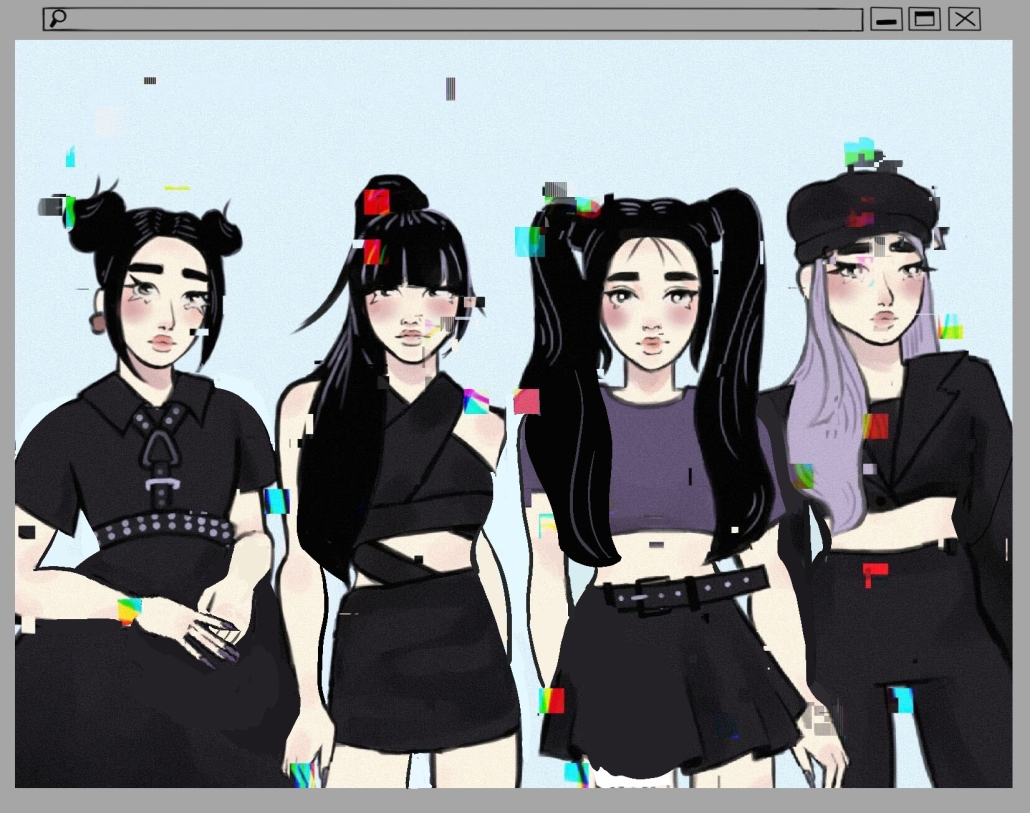Non-Stop K-pop: AI just doesn’t belong

My K-pop TikTok feed, a safe space for me that usually consists of cheap idol edits or over-the-top-detailed song and outfit rankings, was bombarded with clips of MAVE’s debut release, “PANDORA.”
MAVE (메이브) is a girl group under Metaverse Entertainment that consists of four 19- and 20-year-old members: SIU (시우), ZENA (제나), MARTY (마티) and TYRA (타이라). The girls are all Korean, and most of them (apart from SIU) are bilingual. Their stage performances are energetic, and they move with almost robotic precision. Their audience is lively during their shows. At a quick glance, all seems well and normal; That is, until you squeegee your glasses and squint your eyes.
The girls aren’t real.
Every single aspect of their being is AI — artificial intelligence. It’s obvious once you watch for more than five seconds; the way they move is a little too rigid, their hair just seems a little too shiny and their facial expressions and breathing are a little too at ease for a full-out performance. It’s actually quite funny to think that the people in the audience — who, unlike the idols on stage, are real people — are actually just watching empty space that is later edited to include the girls.
I had no idea that this group was even going to debut because I just didn’t care. When æspa (에스파), another girl group, debuted in 2020, I was not very amused with their parent company, SM Entertainment’s, decision to create AI counterparts for the four members, especially as they appeared in music videos, stages and promotions.
By counterparts I mean exactly what MAVE is now, just part-time. Each of the four girls had an AI figure that matched their physical characteristics and were essentially created to enhance the group’s nuance and contribute to an ever-growing storyline.
I understand that the company was likely trying to set its new girl group apart and engender new conceptualization, but the AI never added anything. Honestly, it just felt like a cop-out because SM knew that æspa wasn’t as strong at performing as other groups under their name.
For some reason, this new trend in K-pop makes my blood absolutely boil, and the fact that people are promoting MAVE on social media and following and liking their content upsets me greatly. These girls are programmed to be perfect; they have no human emotion, no story, no inherent talent and no personality. And yet, rather naively, people are falling in love with their “originality.”
It honestly feels like K-pop was just recently able to make a positive name for itself within the past few years because of to BTS’ success and the amount of groups’ world tours traversing across the United States and the rest of the Western world. But with this new technological development, it feels like the music, concepts and fandoms are being thrown back into the “Dark Ages,” where K-pop fans were labeled as cringey or overly zealous, fiending over daydreams that had no foundation in reality (no, you will not be marrying your fav). But at least those idols were real.
It honestly feels ridiculous to even have to be writing about such an issue. Can someone explain to me why MAVE has more than 150,000 Instagram followers? Why does “PANDORA” have 16 million views on YouTube? What is there even to watch? And God, please justify the fact that they have an actual album design and preview (although I can’t seem to find anywhere to purchase it, which is for the better).
I usually love to tote K-pop because of its performative value and adherence to perfectionism (before it becomes toxic). Similarly, you often can’t help but fall in love with the idols and their personalities, their abilities and even their imperfections. You just don’t get that with artificial intelligence.
On a more serious note that diverts from the standard engagement issues, there are rising concerns about the idols’ safety as well, and how this AI technology and its wide-scale availability can inadvertently hurt the real performers it aims to encapsulate. As virtual sex crimes and deepfake porn continue to rise online, controlling their spread and identifying problematic sites in the first place is becoming more and more difficult.
According to an article published in the Korea Times in 2021, “In the case of [æspa], the human members share the same identities as their virtual avatars, so if their digital selves fall victim to digital sex crimes … the human members are also likely to be affected.”
Although it is true that normal, real celebrities have fallen victim to these illegal porn forums, it could be argued that already proposing these idols in a virtual format invites people to alter their movement, facial expressions and more.
There is a real issue with artificial technology that replaces humans in the entertainment industry. In my eyes, it’s ridiculous, and should stop before it gains any traction, if it hasn’t already. It’s honestly an embarrassment to the K-pop world and a slap in the face to all the idols who trained for so many years only to be surpassed by a blank stage.
Daphne Yaman is a sophomore writing about K-pop. Her column, “Non-Stop K-Pop” runs every other Wednesday. She is also an opinion editor at the Daily Trojan.

